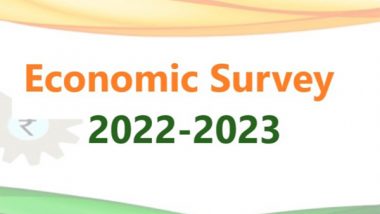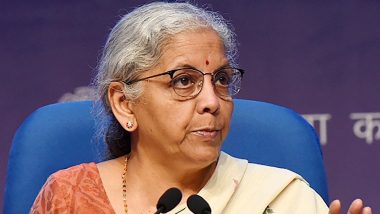New Delhi, January 31: The Economic Survey 2022-23 released on Tuesday has called for simpler tax rules and processes to help Indian-owned start-ups in "reverse flipping" or shifting their base back to India.
The survey said that while external support from the government has made it relatively easier than before for entrepreneurship to thrive, there are several inherent challenges faced by start-ups and many have flipped or set-up bases in foreign countries with favourable legal environments and taxation policies. Economic Survey 2022-23 Live Streaming: Watch Press Conference by Chief Economic Advisor V Anantha Nageswaran.
"The flipping phenomenon ...reflects start-ups venturing out for short-term gains in the dynamic, uncertain geopolitical world. However, the flip can be reversed with collective action by the Government related regulatory bodies and other stakeholders. With solution-oriented strategies, start-ups will continue to be the messengers of India's entrepreneurial dynamism," the survey said. Economic Survey 2022-23 Highlights: Indian Economy Is Poised To Grow Faster in the Coming Decade.
According to the survey, start-ups face issues around funding, revenue generation struggles, lack of easy access to supportive infrastructure, or wading through the regulatory environment and tax structures.
The survey said under "flipping" the entire ownership of an Indian company is transferred to an overseas entity, accompanied by a transfer of all IP and all data hitherto owned by the Indian company.
It effectively transforms an Indian company into a 100 per cent subsidiary of a foreign entity, with the founders and investors retaining the same ownership via the foreign entity, having swapped all shares, the survey said.
"Flipping happens at the early stage of the start-ups, driven by commercial, taxation and personal preferences of founders and investors," the report said.
It recommended simplifying the process for grant of “Inter-Ministerial Board (IMB) certification” for start-ups, simplification of taxation of Employee Stock Options (ESOPs), and simplifying multiple layers of tax and uncertainty due to tax litigation.
The survey recommended simplifying procedures for capital flows in line with countries, such as the US and Singapore who have easier corporate laws, with lesser restrictions on the inflow and outflow of capital and treatment of hybrid securities.
It said that several exemptions available in countries Singapore, the United Arab Emirates, the Netherlands are unavailable in India, and any migration of existing structures to India triggers capital gains tax.
According to the survey, with relatively easy access to capital through a vibrant Private Equity or Venture Capital Ecosystem, changes in rules regarding round tripping, and the growing maturity of India's capital markets have not only slowed down the 'Flipping', but companies are also exploring 'Reverse Flipping'.
(This is an unedited and auto-generated story from Syndicated News feed, LatestLY Staff may not have modified or edited the content body)













 Quickly
Quickly



















